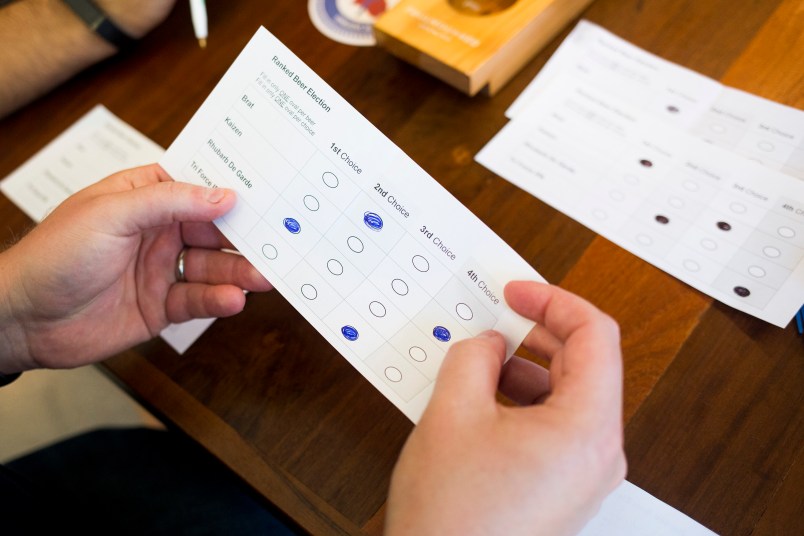Maine voters on Tuesday night reaffirmed that they want to overhaul their state’s elections and move to a ranked-choice system.
The move is likely to increase the national momentum behind ranked-choice voting (RCV), which in recent years has seen a surge of interest amid widespread concerns about election fairness.
By 55 to 44 percent, Mainers approved a ballot referendum that does away with winner-takes-all plurality-style voting in favor of a system that reformers believe gives voters more choice and a stronger voice in selecting candidates who will represent them. Maine will use this system in November’s federal elections.
Under RCV, voters rank all of the candidates in order of preference. The candidate who earns more than 50 percent of the vote wins. If no candidate hits that threshold in the first round, an instant-runoff situation kicks in in which the candidate with the fewest first-place votes is eliminated, and those votes are redistributed to the voter’s second choices.
According to the election reform group Fair Vote, which has led the fight for RCV, the system helps restore majority rule by ensuring that “candidates who are opposed by a majority of voters can never win.” Voters’ second-choice picks actually matter, making them feel like they have more of a say in how an election ends up.
Momentum for RCV in Maine grew after Gov. Paul LePage, a Republican, was twice elected with under 50 percent of the vote, while more liberal candidates split the vote.
This system is already in effect in 11 U.S. cities including San Francisco and Minneapolis; Maine’s statewide Tuesday election was the first time it was used to select nominees for governor, the U.S. House and legislative offices.
The Pine Tree State passed ranked-choice voting by referendum in November 2016, but the decision got caught up in the state Supreme Court and legislature. It became mired in protracted partisan fights, with Democrats largely supporting the voting system and Republicans opposing it. The citizens’ petition passed this week stemmed from a bill passed by the legislature in October 2017 that called for the passage of a constitutional amendment by December 2021 or a permanent end to use of the system.
LePage was a particularly ardent opponent. Hours before voters went to the polls, he called the system “the most horrific thing in the world” and threatened not to certify the election results.
Democratic Sec. of State Matt Dunlap swiftly shut down LePage’s threats, saying that he, not the governor, is responsible for certifying the results.







What, majority rule?
Page apparently cannot grasp the concept of how it works…
Not suprising really…
I really believe this is what would help third parties do better in the US.
LePage should feel lucky to be term-limited out. Wouldn’t win with this style of voting. Can still say he wasn’t thrown out of office by a landslide.
Unless his supporters could mark him as their 1st, 2nd, 3rd, and 4th choice. Is that allowed?
RCV won’t help third parties at all.
But it will keep them from being spoilers.